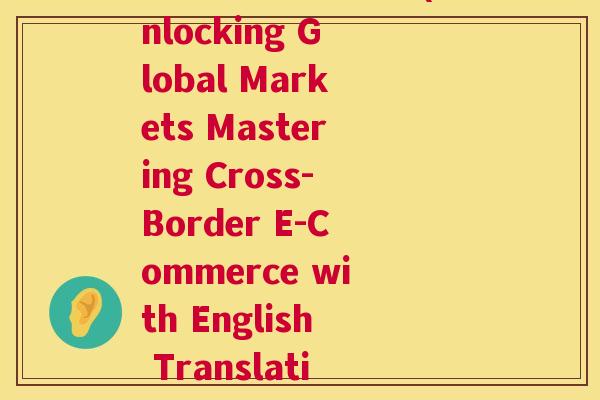"Unlocking Global Markets: Mastering Cross-Border E-Commerce with English Translations" is a comprehensive guide that aims to help businesses and individuals understand the intricacies of cross-border e-commerce and how to effectively navigate this global market. The term "cross-border e-commerce" refers to the buying and selling of goods and services over the internet between customers and businesses in different countries. This guide will delve into various aspects of cross-border e-commerce, including the importance of English translations in facilitating international trade.
1. Introduction to Cross-Border E-Commerce
Cross-border e-commerce has become an essential aspect of global trade in the 21st century. With the internet connecting people from all corners of the world, businesses have the opportunity to expand their reach and tap into new markets. This has led to a significant increase in international trade, with e-commerce platforms like Amazon, eBay, and Alibaba facilitating transactions between buyers and sellers across borders.
2. Challenges of Cross-Border E-Commerce
While cross-border e-commerce offers numerous opportunities for businesses, it also presents several challenges. These include:
a. Language Barriers: One of the most significant challenges in cross-border e-commerce is the language barrier. Businesses need to communicate effectively with customers in different countries, which requires a deep understanding of the local language and culture.
b. Customs and Regulations: Each country has its own set of customs and regulations governing the import and export of goods. Businesses must navigate these complex rules to ensure compliance and avoid penalties.
c. Currency Exchange: Cross-border transactions involve currency exchange, which can be volatile and unpredictable. Businesses need to manage currency risks effectively to maintain profitability.
d. Logistics and Delivery: Shipping goods across borders can be complex and costly. Businesses must find efficient and reliable logistics solutions to deliver products to customers in a timely manner.
3. The Role of English Translations in Cross-Border E-Commerce
English is the most widely spoken language in the world and is often used as a common language for international trade. English translations play a crucial role in cross-border e-commerce by:
a. Bridging Language Barriers: Providing English translations of product descriptions, terms and conditions, and customer support materials can help businesses communicate effectively with customers from different countries.
b. Enhancing Global Reach: By offering English translations, businesses can expand their reach to a global audience, increasing their potential customer base.

c. Improving Customer Experience: High-quality English translations can help businesses provide a seamless and enjoyable shopping experience for customers, leading to increased customer satisfaction and loyalty.
d. Facilitating Business Communication: English translations can help businesses communicate with suppliers, partners, and other stakeholders in the global market, streamlining operations and fostering collaboration.
4. Best Practices for English Translations in Cross-Border E-Commerce
To maximize the benefits of English translations in cross-border e-commerce, businesses should follow these best practices:
a. Hire Professional Translators: It is essential to work with professional translators who have expertise in the specific industry and are familiar with the nuances of the target language.
b. Maintain Consistency: Consistency is crucial in translations to ensure that the brand's message and tone are conveyed accurately across all materials.
c. Localize Content: In addition to translating content, businesses should also localize it to cater to the cultural preferences and expectations of the target audience.
d. Use Translation Management Tools: Translation management tools can help businesses streamline the translation process, ensuring that content is translated accurately and efficiently.
e. Continuously Improve: Businesses should regularly review and update their translations to ensure that they remain accurate and relevant as language and market trends evolve.
5. Conclusion
Cross-border e-commerce offers significant opportunities for businesses looking to expand their global reach. However, to succeed in this competitive market, businesses must overcome challenges such as language barriers, customs regulations, currency exchange, and logistics. English translations play a vital role in facilitating cross-border e-commerce by bridging language barriers, enhancing global reach, improving customer experience, and facilitating business communication. By following best practices for English translations, businesses can unlock the full potential of cross-border e-commerce and achieve success in the global market.




